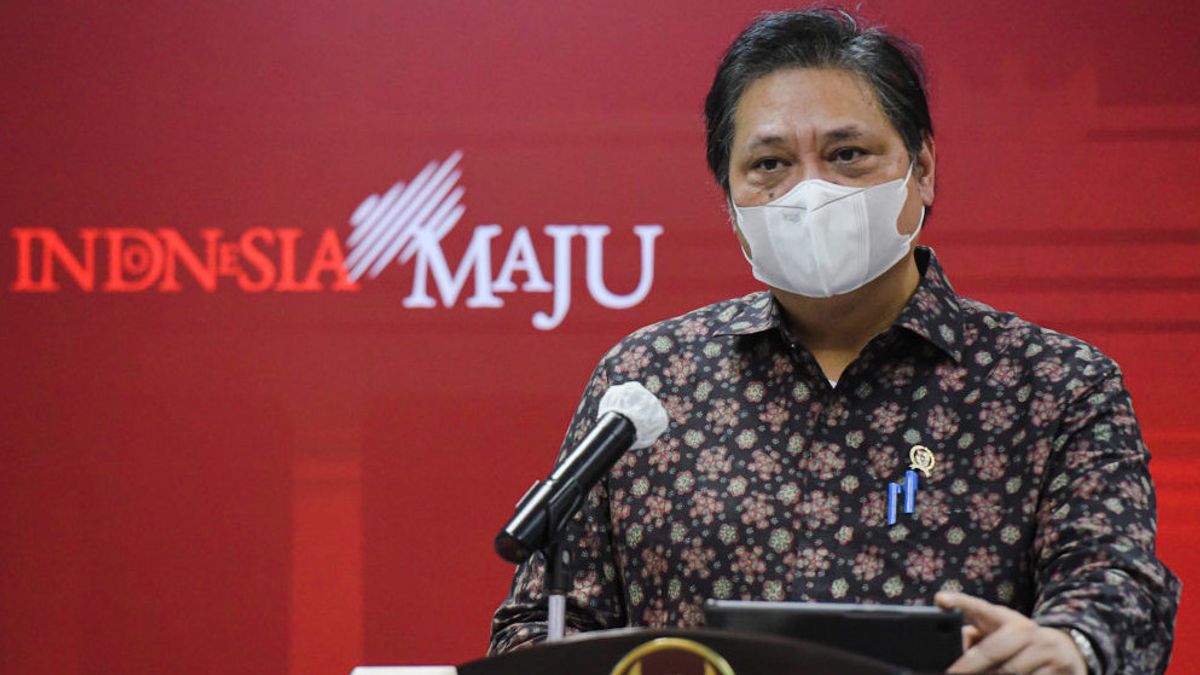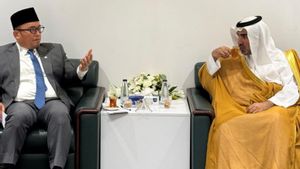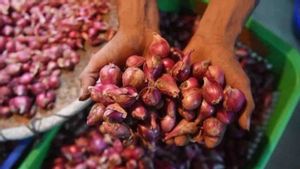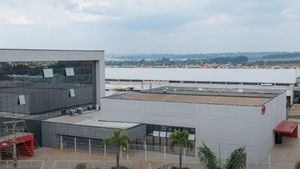JAKARTA - All countries are trying to emerge from the COVID-19 pandemic and encourage economic recovery, including in Indonesia. Complementary policies are needed both in terms of health and the economy, so that both sides can recover at the same time.
In the second quarter of 2021, the Indonesian economy grew by 7.07 percent (yoy), the highest since the sub-prime mortgage crisis or the best in the last 16 years. Indonesia's economic growth is also higher than several peer countries that have released growth figures such as Vietnam (6.6 percent), South Korea (5.9 percent), and Saudi Arabia (1.5 percent).
"In the first semester of 2021, various main indicators continue to show prospects for improvement. The impact of tightening mobility restrictions in July-August 2021 is estimated to be only temporary. Manufacturing activity and demand for KUR financing will begin to increase again in August 2021," said Coordinating Minister for the Economy Airlangga Hartarto in the UOB Economic Outlook 2022 Webinar entitled "Empowering the Indonesian Economy for Stronger Recovery", in Jakarta, Wednesday 15 September.
From the external side, exports showed an increase, so that Indonesia's Trade Balance experienced a surplus for 15 consecutive months and relatively high foreign exchange reserves of 144.8 billion US dollars. This condition shows the maintained resilience of the external sector. The government has also prepared a strategy to encourage economic recovery in the remainder of this year and it is hoped that the economy can return to expansionary growth in the fourth quarter of 2021.
The Indonesian economy is projected to grow in the range of 3.7-4.5 percent at the end of 2021 and 5.2 percent in 2022. This projection is in line with expectations of global economic recovery.
Coordinating Minister Airlangga also explained that achieving the economic growth target would depend on the participation of the community in increasing the effectiveness of controlling the COVID-19 pandemic.
"The government continues to strengthen pandemic control from upstream to downstream to ensure more effective prevention and handling," he continued.
In addition, the National Economic Recovery Program (PEN) will also continue to be improved to support the handling of COVID-19. The Government's commitment is shown through the refocusing of the State Budget in encouraging an increase in the 2021 PEN budget to Rp744.77 trillion.
"This refocusing will support the optimization of PPKM implementation by increasing the budget for various social protections, such as accelerating the disbursement of Cash Social Assistance, increasing the number of beneficiaries of the Basic Food Card, continuing the Electricity Discount Program, and increasing the budget for Pre-Employment Cards and Wage Subsidy Assistance," said Coordinating Minister Airlangga.
The sustainability of the business sector also remains the main focus of the Government. A series of fiscal incentives have been provided to boost the performance of the business sector. As of August 20, 2021, the Government's fund placement program in banks has boosted total credit disbursement of Rp419.78 trillion from Himbara Bank, Sharia Bank, and BPD.
Especially for MSMEs, credit has been disbursed in the amount of Rp. 241.48 trillion or 57.53 percent of the total loan disbursement. In addition to MSME players, support continues to be provided through additional BPUM and PKL assistance, expansion of the credit guarantee program, additional interest subsidies for both KUR and Non-KUR, as well as the addition of the 2021 KUR ceiling to IDR 285 trillion. Recently, the Government has also launched the Cash Assistance Program for Street Vendors and Stalls (BT-PKLW), targeting informal MSME actors who have not been touched by other programs.
Additional support in maintaining purchasing power is also provided through the Pre-Employment Card Program. This program has been given to 2.7 million effective recipients with a total incentive of Rp6.47 trillion during Semester I 2021 in 514 districts/cities.
"Considering the potential impact of Covid-19 which could continue until 2022, the Government is committed to continuing the PEN Program next year. The PEN budget allocation in 2022 is IDR 321.2 trillion. This allocation has the potential to increase following the dynamics of handling the COVID-19 pandemic," he said.
Then, to close the infrastructure financing gap and support the acceleration of investment, the Government has established an Investment Management Agency (LPI). LPI plays a role in developing investment opportunities in various key sectors so that it can support sustainable development.
"Investments managed by LPI are expected to increase productivity, support job creation, and encourage the transition to a new economy. The government will also immediately allocate additional capital of Rp60 trillion in 2021 to support LPI's optimization for the economy," concluded Coordinating Minister Airlangga.
On this auspicious occasion, the President of the Republic of Indonesia Joko Widodo, Indonesian Ambassador to Singapore Suryopratomo, Minister of Trade Muhammad Lutfi, Minister of Cooperatives and SMEs Teten Masduki, Deputy Chairman and Chief Executive Officer of UOB Group Wee Ee Chong, and President Director of PT UOB Indonesia Hendra Gunawan.
The English, Chinese, Japanese, Arabic, and French versions are automatically generated by the AI. So there may still be inaccuracies in translating, please always see Indonesian as our main language. (system supported by DigitalSiber.id)












